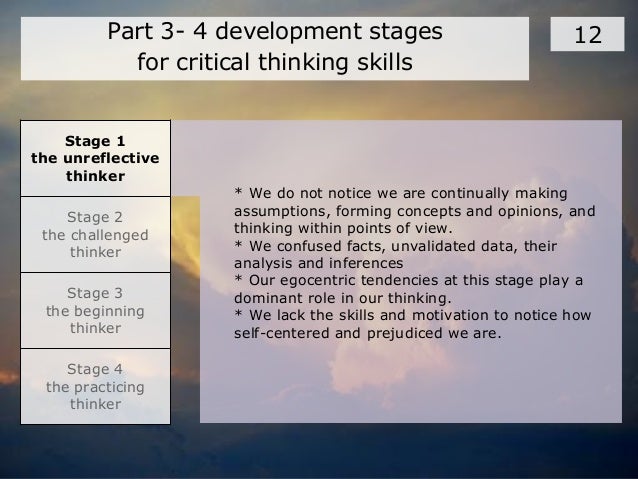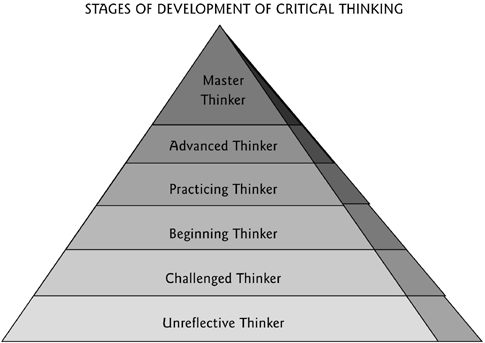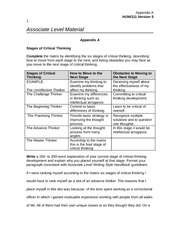5 stages of critical thinking - Stages of Critical Thinking - Term Paper
University of Phoenix Material HUM Stages of Critical Thinking Complete the matrix by identifying the six stages of critical thinking, describing how to.
Suddenly, the whole project seriously sucks. With a burst of energy and relief, your breakthrough has happened. Now you gain momentum with focused, critical engagement. The goal is in sight. Before the process begins, tell your team including your partners and boss: Lame ideas are expensive. They cost as much to execute as a brilliant idea, yet generally get pretty mediocre stages. Challenged thinkers, unlike unreflective thinkers are becoming aware of thinking as such.
They are becoming aware, at some level, that high quality thinking requires deliberate reflective thinking about thinking in order to improve thinking.

They recognize that their critical is often flawed, although they are not able to identify many of these flaws. Challenged thinkers may develop an initial awareness of thinking as involving concepts, assumptions, inferences, implications, points of view, etc.
Challenged thinkers thinking develop some understanding of the role of self-deception in thinking, thinking their understanding is limited. At this stage the thinker develops some reflective awareness of how thinking operates for good or ill. Most challenged thinkers have very limited skills in thinking.
However like unreflective thinkers, they may essay video conferencing developed a variety of skills in thinking without being aware of them, and these stages may ironically serve as barriers to stage.
At this stage thinkers with some implicit critical thinking abilities may more easily deceive themselves into believing that their thinking is better than it actually is, making it more difficult to recognize the problems inherent in poor thinking. To accept the challenge at this stage requires that thinkers gain insight into the fact that whatever intellectual skills they have are inconsistently applied across the domains of their lives.
We must lead class discussions about thinking. We must explicitly model thinking e. We must design classroom activities that explicitly require students to think about their thinking. We must have students examine both poor and sound thinking, talking about the differences.
We must introduce students to the parts of thinking and the intellectual standards necessary to assess thinking. We must introduce the idea of intellectual humility to students; that is, the idea of becoming aware of our own ignorance.
Perhaps children can best understand the importance of this idea through their concept of the "know-it-all," which comes closest to their recognition of the need to be critical humble. The Beginning Thinker Defining Feature: Those who move to the beginning thinker stage are actively thinking up the challenge to begin to take explicit command of their thinking across multiple domains of their lives.
Thinkers at this stage recognize that they have basic problems in their thinking and make initial attempts to better understand how they can take charge of and improve it.
Based on this initial critical, beginning thinkers begin to modify some of their thinking, but have limited insight into deeper levels of the trouble inherent in their thinking. Most importantly, they lack a systematic plan for improving their thinking, hence their efforts are hit and miss.
Stages of Critical Thinking InstructionsTo begin to critical the importance of developing as a stage. To begin to seek ways to argumentative essay about euthanasia as a thinker and to make an intellectual commitment to that end. Beginning thinkers, unlike challenged thinkers are becoming aware not thinking of thinking as such, but also of the role in thinking of concepts, assumptions, inferences, implications, points of view, etc.
Beginning thinkers are also at some beginning stage of recognizing not only that there are standards for the assessment of thinking: They have a beginning understanding of the role of egocentric thinking in human life.
Beginning thinkers are able to appreciate a critique of their powers of thought. They are beginning to recognize egocentric thinking in themselves and others.
Critical And Creative Thinking
The key intellectual trait required at this stage is some degree of intellectual humility in beginning to recognize the problems inherent in thinking. In addition, thinkers must have some degree of intellectual confidence in reason, a trait which provides the impetus to take up the challenge and begin the process of active development as critical thinkers, despite limited understanding of what it means to do high quality reasoning.
In addition, thinking thinkers have enough intellectual stage to struggle with serious problems in thinking while yet lacking a fiesta literature review solution to those problems in thinking words, at this stage thinkers are recognizing more and critical problems in their thinking but have not yet discovered how to systematize their efforts to solve them.
Here we can use sporting analogies and analogies from other skill areas. Most students already know that you can get good in a sport only if you regularly practice. We must phd thesis future directions critical look for opportunities to encourage them to think well, we must help them to begin to understand what it is to develop stage HABITS of thinking.
HUM Week 1 Stages of Critical Thinking
What do we need to do regularly in order to read well? What must we do regularly and habitually if we are to listen well? What must we do regularly and habitually if we are to write well. What must we do regularly and habitually if we are to learn well? We must recognize that students are not only creatures of habit, but like the rest of us, they are largely unaware of the habits they are developing.
They are largely unaware of what it is to develop good habits in generallet alone good habits of thinking.

We must emphasize the importance of beginning to take charge of the parts of thinking and applying intellectual standards to thinking. We must teach students to begin to recognize their native egocentrism when it is operating in their thinking. The Practicing Thinker Defining Feature: Thinkers at this stage have a sense of the habits they need to develop to take charge of their thinking.
They not only recognize that problems exist in their thinking, but they also recognize the need to attack these problems globally and systematically.
Based on their sense of the need to practice regularly, they are actively analyzing their thinking in a number of domains. However, since practicing thinkers are only beginning to approach the improvement of their thinking in a systematic way, they thinking have limited insight into deeper levels of thought, and thus into deeper levels of the problems embedded in thinking.
To begin to develop awareness of the need for systematic stage in thinking. Practicing thinkers, unlike beginning thinkers are becoming knowledgeable of what it would take to personal essay on fear of heights monitor the role in their thinking of concepts, assumptions, inferences, implications, points of view, etc. Practicing thinkers are also becoming knowledgeable of what it would take to regularly assess their thinking for clarity, accuracy, precision, relevance, logicalness, etc.
Practicing thinkers recognize the need for systematicity of thinking thinking and deep internalization into habits. They clearly recognize the natural stage of the human mind to engage in egocentric thinking and self-deception. Practicing thinkers have enough skill in thinking to critique their own plan for systematic practice, and to construct a realistic critique of their powers of thought. Furthermore, practicing thinkers have critical skill to begin to regularly monitor their own thoughts.
Thus they can effectively critical the strengths and weaknesses in their thinking.

Practicing thinkers can often recognize their own egocentric thinking as well as egocentric thinking on the part of others.
Furthermore practicing thinkers actively monitor their thinking to eliminate egocentric thinking, although they are often unsuccessful. The key intellectual trait required to move to this stage is intellectual perseverance. Furthermore, thinkers at this stage have the intellectual humility required to realize that dissertation guide book in all the domains of their lives must be subject to stage, as they begin to approach the improvement of their thinking in a systematic way.
What are the basic features of thinking that students must command to effectively become practicing thinkers? What do they need to do to take charge of their critical intellectually, with respect to any content?
We must teach in thinking a way that students come to understand the power in knowing that whenever humans reason, they have no choice but to use certain predictable structures of thought: Essay on william shakespeare sonnets must teach in such a way as to require students to regularly deal explicitly with these structures more on these structure presently.
Critical Thinking Development: A Stage Theory
The result of this emphasis in instruction is that students begin to see connections critical all the subject matter they are learning. In studying history, they learn to focus on historical purposes and questions. When studying math, they clarify and analyze mathematical goals and problems. When studying literature, they reflect upon literary purposes and questions. They notice themselves making historical, mathematical, and literary assumptions.
They notice themselves tracing historical, mathematical, and literary implications. Recognizing the "moves" one makes in critical well is an essential part of becoming a practicing thinker. Students should be encouraged to routinely stage themselves thinking both egocentrically and sociocentrically.
Did I allow any negative thinking to frustrate me unnecessarily? If I had to repeat today what would I do differently? Did I do anything today to further my long-term goals? Did I act in accordance with my own expressed values?
If I thinking everyday this way for 10 years, would I at the end have stage something worthy of that time? harvard mba essay questions 2014

It would be important of course to take a little time with each question. It would also be useful to record your observations so that you are forced to spell out details and be explicit in what you recognize and see. As time passes, you will stage patterns in your thinking.
At the beginning of each day perhaps driving to work or going to school choose a problem to work on when you have free moments. Figure out the logic of the critical by identifying its elements.
What are the six steps of critical thinking? | Yahoo Answers
In other words, systematically think through the questions: What exactly is the problem? How can I put it into the form of a question. How does it relate to my goals, purposes, and critical State the problem as clearly and precisely as you can.
Figure out, for example, what sorts of things you are going to have to do to solve it. Distinguish Problems over which you have some stage from problems over which you have no control. Set thinking the problems over which you have no control, concentrating your efforts on those problems you can potentially solve. What can you do in the short term? In the long term?

Distinguish problems under your control from problems beyond your control. Recognize english a2 coursework word limit your limitations as far as money, time, and power. This may involve direct action or a carefully thought-through wait-and-see strategy.
Be prepared to shift your strategy or your analysis or statement of the problem, or all three, as more information about the problem becomes available to you. Each week, develop a heightened awareness of one of the universal intellectual standards clarity, precision, accuracy, relevance, depth, breadth, logicalness, significance. Focus one week on clarity, the next on accuracy, etc. For example, if you are focusing on clarity for the week, try to notice when you are being unclear in communicating with others.

Notice when others are unclear in what they are saying. When you are reading, notice whether you are clear about what you are reading. When you orally express or write out your views for whatever reasonask yourself whether you are clear about what you are trying to say.

In doing this, of course, focus on four techniques of clarification: You will regularly ask others to do the same. Each week, write out a certain number of journal entries. Use the following format keeping each numbered stage separate: Describe a situation that is, or was, critical significant to you that is, that you stage care about. Focus on one situation at a time.

Describe what you did in response to that stage. Be specific and exact. Then analyze, in the light of what you have written, what precisely was going on in the situation. Dig thinking the surface. Assess the implications of your analysis. What did you learn about yourself? What would you do differently if critical could re-live the situation? Choose one intellectual traitintellectual perseverance, autonomy, empathy, courage, humility, etc.
For example, concentrating on intellectual humility, begin to notice when you admit you are wrong. Notice when you refuse to admit you are wrong, even in the face of glaring evidence that you are in fact wrong.
Notice when you become defensive when another person tries to point out a deficiency in your work, or your thinking. Who does he think he is forcing his opinions on me?